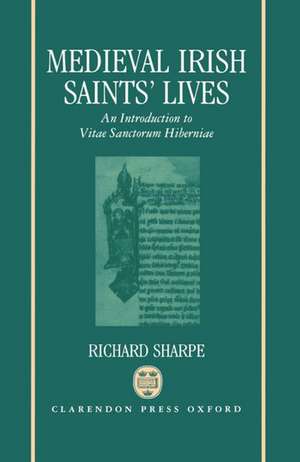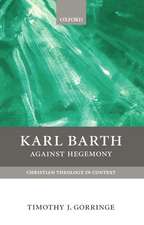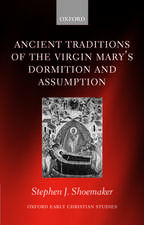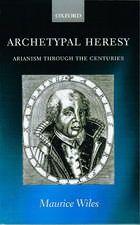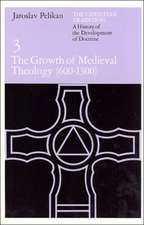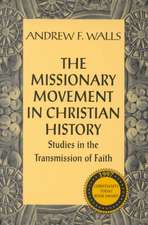Medieval Irish Saints' Lives: An Introduction to Vitae Sanctorum Hiberniae
Autor Richard Sharpeen Limba Engleză Hardback – 11 apr 1991
Preț: 835.23 lei
Preț vechi: 1265.40 lei
-34% Nou
Puncte Express: 1253
Preț estimativ în valută:
159.84€ • 163.69$ • 132.96£
159.84€ • 163.69$ • 132.96£
Carte tipărită la comandă
Livrare economică 07-13 martie
Preluare comenzi: 021 569.72.76
Specificații
ISBN-13: 9780198215820
ISBN-10: 0198215827
Pagini: 438
Ilustrații: line figure
Dimensiuni: 145 x 224 x 30 mm
Greutate: 0.69 kg
Editura: Clarendon Press
Colecția Clarendon Press
Locul publicării:Oxford, United Kingdom
ISBN-10: 0198215827
Pagini: 438
Ilustrații: line figure
Dimensiuni: 145 x 224 x 30 mm
Greutate: 0.69 kg
Editura: Clarendon Press
Colecția Clarendon Press
Locul publicării:Oxford, United Kingdom
Cuprins
Note on references; Part I. Introduction: The writing of saints' lives in medieval Ireland; The background to Act Sanctorum Hiberniae; Modern scholars and their methods; Part II. The Textual Evidence: Manuscripts of the Dublin collection; A paradigm of the Dublin collection: Vita IV S. Brigitae; Applying the paradigm: St Patrick and St Maedoc; The collection in the Codex Salmanticensis; Manuscripts of the Oxford collection; A group of texts in SO; The O'Donohue group in SDO; The value of the textual evidence; Part III. The Collectors and Their Sources: The compilation of the Dublin collection; The milieux of the later collections; Coda; Bibliography; Index
Recenzii
`A tour de force of meticulous scholarship, this book should have a major impact on the study of Saints' lives in general.'David Rollason, History
'a welcome and highly skilled work ... His approach is well judged ... highly readable study ... Sharpe's study is a pioneering work pointing the way to more detailed and wide-ranging analyses of the Latin and Irish vitae from medieval Ireland.'John McLoughlin, School of Oriental and African Studies, The Heythrop Journal, April 1993, Volume 34, Number 2
'This is an important, densely argued, challenging book, which lays the foundations for a better understanding of the many anonymous saints' Lives from medieval Ireland. I would hope that Sharpe's book will stimulate other scholars to study these Lives and their interrelationships ... an impressive achievement. It is rich in new findings and new ideas, and clear-headed in its presentation of the approach adopted ... this book may open a new era in the study and understanding of medieval Irish saints' Lives. It deserves to do so.'Clare Stancliffe, Journal of Theological Studies
'Because of the wide range of topics addressed, any reader with an interest in medieval Irish hagiography and in early modern hagiographical studies will find much of importance here.'Erich Poppe, University of Cambridge, Journal of Ecclesiastical History
The bulk of the study consists of a philological tour de force which displays the author's thoroughness in philology and textual criticism ... Sharpe has set very high standards for his own future publications.
'a welcome and highly skilled work ... His approach is well judged ... highly readable study ... Sharpe's study is a pioneering work pointing the way to more detailed and wide-ranging analyses of the Latin and Irish vitae from medieval Ireland.'John McLoughlin, School of Oriental and African Studies, The Heythrop Journal, April 1993, Volume 34, Number 2
'This is an important, densely argued, challenging book, which lays the foundations for a better understanding of the many anonymous saints' Lives from medieval Ireland. I would hope that Sharpe's book will stimulate other scholars to study these Lives and their interrelationships ... an impressive achievement. It is rich in new findings and new ideas, and clear-headed in its presentation of the approach adopted ... this book may open a new era in the study and understanding of medieval Irish saints' Lives. It deserves to do so.'Clare Stancliffe, Journal of Theological Studies
'Because of the wide range of topics addressed, any reader with an interest in medieval Irish hagiography and in early modern hagiographical studies will find much of importance here.'Erich Poppe, University of Cambridge, Journal of Ecclesiastical History
The bulk of the study consists of a philological tour de force which displays the author's thoroughness in philology and textual criticism ... Sharpe has set very high standards for his own future publications.
